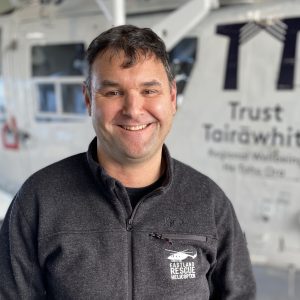It was a polytech course that led Gareth McDougall to the work in adventure tourism that in turn led to paramedicine. And that was that career it brought him back to his home town of Gisborne.
After more than 20 years out of the region, Gareth returned in mid-2023 to take up the role of critical care flight paramedic with the Trust Tairāwhiti Eastland Rescue Helicopter service.
And it was more than a sideways move from his former home at Sydney’s Bondi Beach . . . he also moved “up” in changing his work from land-based ambulance care to a career in the air.
“I had done a bit of flight training back in Queenstown but this is a lot more intensive,” he says. “I was keen to come back to be closer to my family, and the helicopter service here has a great team doing really invigorating work.”
Gareth’s journey started in 1991 with a tourism course at the then-Tairāwhiti Polytechnic, followed by one in Rotorua that focused more on adventure tourism.
He then worked for more than a decade in the industry, taking a year out to undergo ambulance training in Auckland.
“No matter how careful you are in adventure tourism there is always a risk of accident and injury and I certainly saw a bit of that,” he says. “That’s what got me started.”
By 2004 Gareth had secured a job with the New South Wales ambulance service where he worked for nearly 20 years, along the way completing a Bachelor in health sciences, teaching paramedicine students at Western Sydney University, and starting his own post-grad studies in critical care.
Then when he arrived in Gisborne there was more education to come . . . he spent at week at Search and Rescue Ltd’s Taupo base to undergo his medical induction, followed by another week of training in the aviation skills needed before he took to the air.
“We did a lot of things like winch training so it was all pretty new and exciting and a challenge to tie in with my existing skill base,” he says.
“Anyone doing this sort of work will tell you there is a big risk of fatigue or burn-out, and this role has really got my enthusiasm going again.”
Within just weeks of joining the Trust Tairāwhiti Eastland Rescue Helicopter team, Gareth McDougall had already been on multiple flights to treat patients in some of the more remote areas of the region.
“Coming from an urban environment in Australia, that change has been especially interesting and rewarding,” he says.
“Up the East Coast, for example, there are incredible staff and volunteers but we get to bring this extra layer of critical care training and experience, and that’s a privilege I am really enjoying.”
